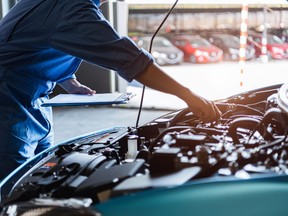Hanging onto your car can save you money, but not maintaining it will cost you

Recommended Videos
Some people can’t afford a new, or new-to-them, car. Some have announced their gas-powered vehicle will be taken from their cold dead hands. Some people actually believe when we buy an expensive product, it should last. Whatever the reason, we’re keeping our cars for longer than ever before. The WSJ report however, is pointing to a troubling trend: some consumers are hesitating not only on spending money to replace a vehicle, but also in some cases, to maintain it. Some aftermarket outfits — parts suppliers, tires, oil change shops — are reporting steep drops in sales, and some are taking a hit on the stock market. Tire shops are taking a hit on people opting for cheaper imports, but one round of inferior tires should be enough of a warning for anyone.

There is a laundry list of factors to consider: cars are built more reliably, and they should be lasting longer and require less maintenance. Hauling your new(ish) car back to the dealer for a tune-up (remember those?) every few months is a thing of the past. We expect — and for the most part, receive — vehicles that will be worry-free for years.
Maintenance is cheaper than repair
The WSJ piece is direct: many people are keeping their cars out of economic necessity, but they’re delaying maintenance for the same reason. Maintenance is always, always, always cheaper than repair, and though any celebration of people not cycling through cars the same way they do paper towels is encouraging, we need to take note of the real reasons people might be doing so. A poorly maintained vehicle is dangerous for owners and other road users. If basic safety levels are compromised, that’s a problem for all of us.
Much of the recent talk in the aftercare market has been targeted to new tech: will you be able to have options when servicing your electric or hybrid vehicle? While the sector has been making huge strides in training for the coming changes, they’ve never been better situated to take care of your existing vehicle. Recessions and economic uncertainty are nothing new, and history points to cyclical shifts most of us have endured. But maintaining an older car to delay the purchase of a new one requires you to service that older car or end up paying a lot more.
A few weeks back, Daniel Ross, senior analyst at Canadian Black Book, noted a change in consumer attitudes as consumers coped with rising costs. He said the push to hybrids and plug-ins signifies buyers considering the total cost of ownership instead of just a monthly outlay — buying a car by the month. If you have equity in your car or it’s paid off outright, why climb into a losing proposition if the car you already have is certainly good enough? As the cars on our roads continue to live a longer life, it seems drivers are finally making peace with what’s sitting in their driveways.

Every year, more and more features that were once on offer only at luxury levels are increasingly standard on every vehicle. Legislation is always lagging, but from daytime running lights to ABS, traction control to backup cameras, we’re incrementally making our way to safer cars at every price point. I don’t have to buy a new car to get some pretty great safety and comfort features that have been common for years now.
It also looks like we’re exercising the right to resist the siren call of marketing campaigns that tell us we need to have the latest and greatest, with many of us clearly understanding adapting to increasingly more complex systems — especially infotainment — is an expense of time and energy. Hey manufacturers, less razzle-dazzle, more common sense.

Sign up for our newsletter Blind-Spot Monitor and follow our social channels on X, Tiktok and LinkedIn to stay up to date on the latest automotive news, reviews, car culture, and vehicle shopping advice.